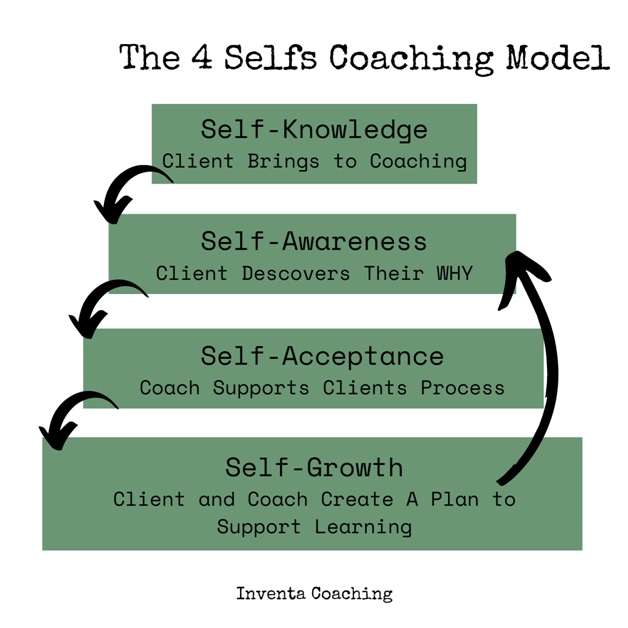A Coaching Model Created by Emily Rayburn
(Self-Development Coach, UNITED STATES)

The 4 Self-coaching model is circular in nature, meaning that the steps are not necessarily linear and often one part of the model will lead to another. Oftentimes after having a moment of self-awareness clients will revisit other steps with greater clarity. Furthermore, personal growth is a continued journey and each new learning tends to move clients onward to new learnings and areas for more inner work and growth.
Self-Knowledge
Clients generally come to the coaching process with some self-knowledge, meaning things they believe to be true about themselves. They may or may not be aware of where the self-knowledge comes from. It may be from their values, underlying beliefs, cultural influence, or childhood experiences, etc. The coach can use observation to challenge the client to be sure they really understand what they would like to gain from the coaching process. Clients also come to coaching with the desired outcome, what they’d like help understanding, moving forward with, or what they’d like to achieve. This is also a form of self-knowledge. By listening to clients, asking questions, and encouraging them to get curious about their self-knowledge we begin to break down self-knowledge into the other “selves” of the model.
Self – Awareness
Once the client begins to get curious about what they know to be true about themselves we start to develop more self-awareness. This is where the client begins to understand the motivation, the why, behind the topics explored in the self-knowledge area. Oftentimes this is where the client has an “ah-ha” moment of discovery. If using the Enneagram this is when we come up with a type for the person or help the client fully understand their type. As I coach I won’t tell a client what their type is, I may offer suggestions and help in exploration, but the client is the only one who can say what type they are. This helps in the Self-Awareness phase because we can then use the Enneagram as a map for more exploration of the clients’ why.
Self-Acceptance
Now that the client has clarified, possibly changed, or better defined their goals, and has uncovered some new self-awareness around their motivations, we are ready to process through those new learnings. The coach acts as a support as the client leads. The client may find it challenging to accept new truths or may be very excited to put this new learning to use, so it’s very important the coach takes her lead from the client and supports them through this time of transformation. When using the Enneagram, taking out the time to process this information through the 3 centers of intelligence is very helpful. It may also be important for the coach to be aware that the client may need other modalities of support and may need to offer suggestions for therapy, bodywork, etc…if ever the scope of coaching is too limited for the client to fully embrace these new learnings and move to self-acceptance.
Self-Growth
Self-growth happens once the client has fully explored and accepted the elements of the other “selfs” and is ready to take action. The coach can help the client come up with a plan to make use of these new findings in everyday life as they continue their growth journey. The client might come up with a plan which leads to new learnings that must be further explored back in the other “self” parts of the coaching process. Ultimately the client will be able to better execute the exploration of the 4 selves without assistance from the coach. This model then becomes their foundation for a life of inner work and personal transformation. If using the Enneagram this is a wonderful opportunity to learn more about movement points, wings, and triads for growth path ideas.